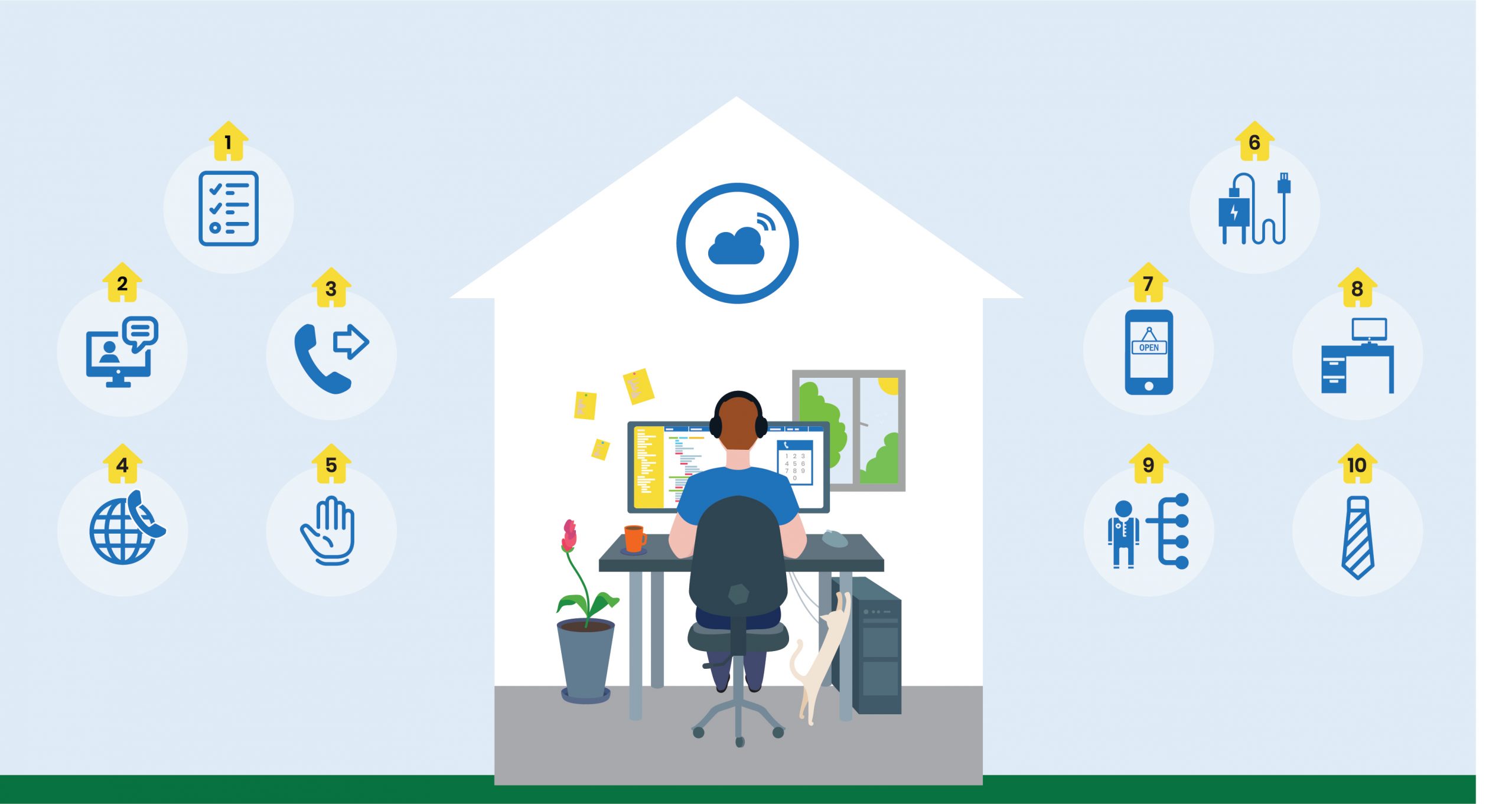10 Trusty Working from Home Tips

Your company has finally decided to let you start working remotely. This is it, the day you’ve been waiting for. No more claustrophobic cubicles or tupperware lunches for you!
You boot up your laptop, open a new project… and before you know it the whole day is gone.
What on earth happened?
It’s not that you wasted your time, you just couldn’t seem to get in the zone and block out all the new distractions you aren’t used to having at the office.
Don’t worry, dear reader, I feel your productivity pain. I’ve been working from home the past few weeks, and between my cat’s adorable face and the beckoning darkness of the TV screen, I’ve found it harder than usual to complete projects efficiently.
Using myself as a remote work guinea pig, I put together these tips and tricks to help hold myself accountable when working from home, and I believe they’ll give you the same boost they’ve given me.
Turning your home into your office presents a number of challenges, but with proper planning and creativity, you can stay motivated, knock out projects, and make your boss forget you ever even left.
 1. Schedule To-Do Lists in Advance
1. Schedule To-Do Lists in Advance
Studies show that we’re much better at making good choices if we don’t have to fulfill them right now.
For instance, people who make shopping lists in advance usually buy healthier items than people who trust their hungry gut in the store. It’s called hyperbolic discounting, and it works just as well for working from home as it does for meal prepping.
By scheduling your remote work at the start of every day and week, you can turn this cognitive bias to your advantage and knock out projects. Look at your blocks of work time and outline goals for each. Plan out how you’d like to spend your days productively so you aren’t tempted to turn on the TV.
By creating appointments with yourself, you trick your brain into taking your agenda more seriously than if you tried to make it up as you go.
 2. Set Up a Personal Conference Line
2. Set Up a Personal Conference Line
One of the most difficult parts of working from home is getting people together for meetings. When you’re in the office, it's easy to grab a few people and have a quick pow-wow. But when you’re working from home, wrangling your colleagues over chat or email is a whole different beast.
Having a personal conference line with audio and video capabilities lets you make plans or catch up with your team whenever you’re all available, or whenever you put on the calendar.
Plus, seeing your lovely face from time to time reminds coworkers that you’re still a valuable team member no matter where you provide that value from.

 3. Forward Everything. Everything…
3. Forward Everything. Everything…
It’s unbelievably easy for messages and notes to get lost when you transition from working at the office to working from home, so make sure all your communications channels are forwarded before you leave.
✔ Forward calls from your desk phone to your personal devices (more on that in a moment).
✔ Save all your documents and files to a cloud drive you can access at home.
✔ Set up voicemail-to-email forwarding if you don’t already have that active on your extension.
✔ Set up a temporary voicemail message letting callers know if you expect to have any downtime.
There’s nothing more inconvenient than getting your home office all ready to go, and then suddenly remembering something that requires you to drive all the way back to work.

Current FluentStream clients can access these features immediately. Learn how to use Call Forwarding, Voicemail-to-Email forwarding and Temporary Voicemail Messaging.
If your communication provider doesn't offer these tools, contact us today.
 4. Download a Browser Dialer
4. Download a Browser Dialer
Browser dialers are software that let you use your laptop as a work phone and answer calls right from the couch. Since they use your regular extension, it’s just as easy to transfer calls or contact clients as it is at your desk.
The best part of browser dialers is that, instead of just replacing your desk phone, they actually give you more functionality including texting and instant access to your voicemail or call history.

You can learn more about our Browser Dialer, called WebPhone here.
You can download the FluentStream WebPhone from the Chrome Store here.
 5. Stop Before You're Done
5. Stop Before You're Done
You’ll often find yourself with extra downtime when you get separated from your regular office schedule, so having at least one project on deck you’re excited to work on makes it much easier to seize the moment and be productive.
When working on long-term projects that require multiple sessions, it’s always good to stop at a place that makes it easier for you to pick it back up later.
For example, when I’m really in the groove on a blog post I enjoy writing (like this one!), I’ll purposely stop before I’m finished so I can look forward to jumping back in.
 6. Don’t Let Your Devices Die on You
6. Don’t Let Your Devices Die on You
No remote work scenario better replicates a horror movie jump scare than having a whole day of work cued up on your laptop and suddenly realizing it’s about to die. The twist? You left your charger at work.
Don’t let this be the story of your productivity’s demise.
Even if you’re just working at home for the day, make sure you check, double check, and then triple check that you packed all your chargers.
If you find yourself taking your devices for granted, I recommend reciting the classic creed from Full Metal Jacket.
This is my laptop. There are many like it but this one is mine.
With me, my laptop is useless. Without my laptop, I am useless.
 7. Turn your Cell Phone into a Business Phone
7. Turn your Cell Phone into a Business Phone
Make sure that you’ve downloaded your business phone system’s mobile app onto your cell phone so you can enjoy your ideal work-life balance without worrying about missing an important call from your boss or leaving your customers hanging until tomorrow.
One of the best parts of working from home is the flexibility it gives you to make your own schedule and step away when it’s convenient. But as we all know, convenient for you isn’t always convenient for your customers.
With a business mobile app, you can make and receive calls from your personal cell phone as though you’re right there in the office.
 8. Pick a Dedicated Work Spot
8. Pick a Dedicated Work Spot
If you’re like me, you’d prefer to have a full home office battle station complete with a standing desk, multiple monitors, and cup holders.
However, if you’re like me, you actually do your remote work on a laptop at the kitchen table (with no cup holders). Whatever your situation or preferences, just make sure you use your home workspace exclusively for work.
Make sure family and friends know what your work area and hours are so you can maintain clear boundaries throughout the day. The same goes for pets. Yes, your cat and/or dog is the cutest ever and you want them by your side always. But more often than not, they are also an enormous distraction.
Having defined boundaries between where you work and where you play is also handy for deciding when you’re finished for the day. If you keep your laptop in front of you all night while you’re watching TV, it’s all too easy to flip it back open and send one more email, or try to finish one more quick task. Before you know it, you’ve missed an entire episode of The Office because you never really left your office.
 9. Manage like a Boss, Even in Your Pajamas
9. Manage like a Boss, Even in Your Pajamas
For all our sales and support team managers out there, this one’s for you!
It may seem impossible to adequately stay on top of your team’s communications from home, but web-based management tools make the impossible feel easy.
Features like our Live Manager allow you to track and participate in all the real-time conversations happening across your entire phone system.
For instance, if one of your support agents needs help with an angry client, or a salesperson asks for backup closing a deal, a good management tool lets you jump right into that call or transfer it to yourself no matter where you’re working that day.
Whether you’re just at home sick for the day or need to be out of the office for a while, having the right management tool is critical for keeping up to speed on your team’s performance.

 10. Always remember to Get Dressed for Meetings
10. Always remember to Get Dressed for Meetings
Sounds obvious, right? But you wouldn’t believe how many remote employees forget to look professional (or in some cases forget to put clothes on at all) and get caught with either their literal or metaphorical pants down.
Some people recommend dressing for remote work the same way you’d dress for the office, to remind yourself that you’re a real professional doing real work.
We at FluentStream say that’s a load of hooey and takes away one of the biggest perks of working from home. Wear whatever you want as long as you can comfortably stay productive.
Again… unless you know you have a call scheduled. In that case, throw on something fancy enough to be professional but still casual enough to make your in-office coworkers jealous.



